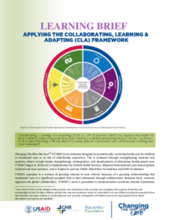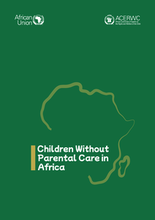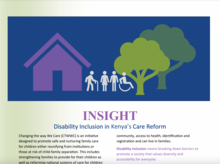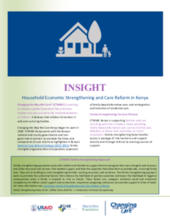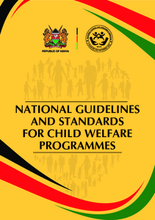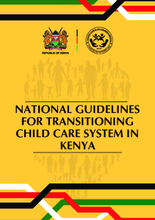Displaying 131 - 140 of 1622
The Regional Learning Platform on care reform for Eastern and Southern Africa provides an opportunity for government, UNICEF and others involved in care reform
Since care reform is a long and complex process, requiring collaboration between many diverse actors, with different change pathways in diverse contexts, the Changing the Way We Care initiative set out to learn from different demonstration countries, build national and regional knowledge, and reinforce global momentum for family care. This learning brief describes some of that journey.
This brief shares how the initiative used CLA related to the social service workforce strengthening and case management.
The African Committee of Experts on the Rights and Welfare of the Child (ACERWC/the Committee), in collaboration with African Union Member States, partner organizations, children and young people, launches the first of its kind Continental Study on Children Without Parental Care (CWPC) in Africa. The study, conducted from 2020 to 2022, amid the COVID-19 pandemic, covered over 43 countries in the five regions of Africa.
Disability inclusion means breaking down barriers to promote a society that values diversity and accessibility for everyone. In 2023, Changing the Way We Care Kenya included a disability inclusion reflection learning exercise aimed at collecting views and feedback, and documenting how the initiative had impacted on lives of caregivers and children with disabilities, and how disability issues were be included in the care reform agenda.
Case management is used with both families at risk of separation and those where children have already separated and are in the process of being reintegrated, including biological family or placed into an alternative family (e.g., foster or kinship). The end goal of case management is that children are safe and nurtured within a family that is able to care for them, and access needed services that address risks and increase resilience.
This insight from Changing the Way We Care provides an overview of the household economic strengthening (HES) activities that were part of a holistic family strengthening approach in Kenya.
This webinar introduced new global inter-agency guidance on kinship care. During the webinar, panelists shared key lessons learnt on how to support kinship care, drawing particularly on examples of promising practices from South Africa, Zimbabwe, Liberia, and Brazil.
NAIROBI — At the height of the HIV/AIDS epidemic, when up to 12 million people were infected across sub-Saharan Africa, Nyumbani Children’s Home offered a refuge to Kenya’s dying children. Later, the institute, run by a Catholic charity, fought for the first batches of retroviral drugs for its sick toddlers.
These guidelines provide minimum standards to be adhered to in the provision of Child Welfare Programmes; The guidelines will also provide a framework within which state and non-state actors shall develop, design, and implement childcare and welfare programmes to enhance child rights, strengthen family and community-based care.
These national guidelines provide a roadmap of activities to guide the state and non-state actors in Kenya to streamline the transitioning of care systems, children and institutions in the country.

